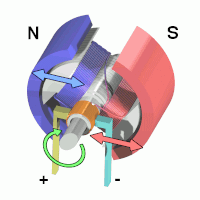
Photo from wikipedia
A data-driven model-free adaptive sliding mode control (MFASMC) method is proposed to tackle the problems of inaccurate model and time-varying parameters of a micro electro-magnetic linear actuator system, considering the… Click to show full abstract
A data-driven model-free adaptive sliding mode control (MFASMC) method is proposed to tackle the problems of inaccurate model and time-varying parameters of a micro electro-magnetic linear actuator system, considering the dependence of existing model-based control methods on the system dynamics model and the impact of unmodeled dynamics on the control performance. Firstly, the pseudo-gradient concept in the model-free adaptive control (MFAC) framework is used to transform the electromagnetic linear actuator dynamics model, which is difficult to obtain parameters accurately, into a full-format dynamic linearized data model, the dependence of the controller on the electromagnetic linear actuator model is reduced. To compensate for the effects of unknown perturbations, an improved discrete sliding mode exponential convergence law is introduced to derive a new composite control algorithm based on the pseudo partial derivative estimator, which improves the robustness of the control system. Then, the convergence of the control error and the stability of the system are demonstrated by theoretical analysis. The results show that the proposed MFASMC reduces the 10 mm step response time of the electromagnetic linear actuator by 46.3% and 25.3% compared with proportional-integral-derivative control (PID) and MFAC. The phase lag time and root-mean-square error of MFASMC under sinusoidal conditions are 0.8 ms, 0.178 mm respectively, and the steady-state error does not exceed 0.05 mm. The experimental and simulation results keep the error within 5%, the proposed control algorithm has good trajectory tracking response speed and control accuracy, and has good robustness to system uncertainty and external force disturbance.
Journal Title: Journal of Micromechanics and Microengineering
Year Published: 2022
Link to full text (if available)
Share on Social Media: Sign Up to like & get
recommendations!